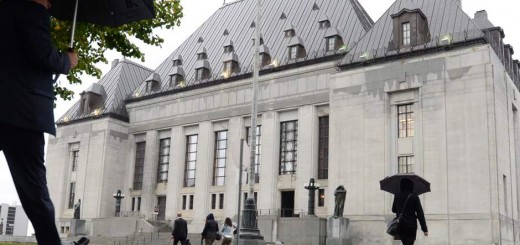R v Reilly: Stay of Proceeding is Not a Remedy for Systemic Charter Breaches

When someone’s Charter rights are breached, s. 24(1) of the Charter provides that a court can issue a remedy to the individual for the breach. In criminal cases, the remedies can take various forms, including a reduction in one’s sentence or through an award of monetary damages. In extreme cases, a judge may order that a prosecution be stayed, meaning the charges against the accused are withdrawn and the prosecution ceases.
Generally, Charter remedies under s. 24(1) are available on an individual basis for the discretionary decisions or actions of the government. Recently, the issue of remedies for systemic breaches of Charter rights has come up in criminal cases where individuals seek a remedy for widespread practices in the criminal justice system — e.g., R v Jordan, 2016 SCC 27. Most notably, the Supreme Court of Canada (“SCC”) has granted stays of proceedings for accused persons upon violation of their s. 11(b) rights through unreasonably long delays before trial. In R v Reilly, 2019 ABCA 212, [Reilly] the Alberta Court of Appeal (“ABCA”) addressed the granting of stays to remedy systemic breaches of ss. 7, 9, and 11(e) rights of accused persons who are held in custody pending a bail hearing beyond the statutory limits prescribed in the Criminal Code, RSC 1985 c C-46. The ABCA overturned the stay, holding that the trial judge was improperly motivated to provide a remedy to an individual for what the judge perceived to be a systemic issue.
Factual Background and Trial Judge’s Decision
The Criminal Code places a 24-hour limit on the amount of time a person can remain in custody following arrest and prior to appearing before either a judge or Justice of the Peace. In Alberta, there were a number of concerns with the bail system, including the fact that police officers were conducting bail hearings on behalf of the Crown, that there was a lack of duty counsel available to represent accused persons at bail hearings, and that delays of over 24 hours frequently occurred before an accused person could appear in court.
The provincial government responded to these concerns by implementing large scale reforms of the bail process. These reforms included dedicated Crowns to handle bail matters instead of police officers. However, evidence showed that these reforms actually contributed to lengthier delays than under the previous bail regime (Reilly, para 15). These delays under this newer regime were at issue in Reilly.
Mr. Reilly was charged with assault causing bodily harm, unlawful confinement, mischief, and a failure to comply with a probation order arising from a domestic incident, leaving the complainant with visible injuries and rendering her unconscious for a short period of time (Reilly, para 8). He was detained and held in custody for over 35 hours before he was able to appear in court. Mr. Reilly argued that his detention violated his Charter rights. The Crown conceded that the prolonged detention before appearing in court violated his rights under ss. 7, 9 and 11(e).
The trial judge ordered a stay of proceedings because of the breaches of his Charter rights, resulting from the systemic nature of the breaches. The Crown appealed the stay of proceedings but maintained their concession that the detention did, in fact, breach Mr. Reilly’s Charter rights. The only issue on appeal at the ABCA was whether or not a stay of proceedings was an appropriate remedy, given the breaches and their alleged systemic nature.
The ABCA Decision
The ABCA overturned the trial judge’s decision and held that a stay of proceedings was not the proper remedy in these circumstances. They determined that a stay was not appropriate for three reasons: first, the trial judge did not conduct the proper analysis required under s. 24(1) in order to issue a stay of proceedings as a remedy; second, the stay of proceedings was given based on a failure to properly consider whether or not this issue warranted a systemic remedy or not; and finally, a stay of proceedings in this case specifically, and in many other cases of a similar breach, would not be in the public interest
The Test for a Stay of Proceedings was Misapplied
The test for a stay of proceedings comes from the case R v Babos, 2014 SCC 16 [Babos] and holds that a stay of proceedings is an “exceptional remedy” and is only available in “extreme cases” (Babos, para 30). In the case of a criminal proceeding, there are two categories of cases where a stay of proceedings may be warranted: where trial fairness is compromised or a where “state conduct undermines the integrity of the judicial process” also known as the “residual category” (Babos, para 32). In these circumstances, a stay is still only available where there is “no alternative remedy available capable of redressing the prejudice” (Babos, para 32). However, where there is “uncertainty” about whether a stay is appropriate in the circumstances, a judge may balance the interests in favour of granting a stay “such as denouncing misconduct and preserving the integrity of the justice system” against the public interest of hearing a criminal case on its merits. (Babos, para 32).
In these circumstances, the ABCA holds that the prolonged detention did not compromise Mr. Reilly’s fair trial rights (Reilly, para 30). Furthermore, the Court found that there were other remedies available that would have addressed the prejudice that Mr. Reilly suffered as a result of the detention. If he was eventually convicted of some or all of the charges, the sentencing judge could have reduced his sentence or given him credit for the time he spent in custody. He also could have claimed damages for the prolonged detention. The ABCA found that the trial judge’s emphasis on denouncing the state conduct and the systemic nature of the circumstances that led to the breach was not properly balanced with society’s interest in adjudicating criminal cases on their merits.
The Trial Judge Relied on Irrelevant Factors
In addition to incorrectly applying the test for a stay of proceedings, the ABCA also found that the trial judge was “influenced by a number of irrelevant factors”. This included factors about the bail system as a whole, despite a lack of evidence that these circumstances played a role in the prolonged detention of Mr. Reilly, specifically. The trial judge made comments on the availability of duty counsel, the capacity of police holding cells, and the increased remanded population within Alberta correctional centres.
The trial judge, according to the ABCA, also failed to identify when individuals were entitled to a stay of proceeding when systemic practices breached particular Charter rights (Reilly, para 46). The ABCA made the point that the remedies for systemic breaches were not primarily the responsibility of the judiciary (Reilly, para 47). From there, the ABCA pointed out that the breaches were indeed systemic in nature and that the Crown’s position that the delays were caused by the transitioning between bail regimes was inadequate.
Systemic remedies are far less common than remedies for individual breaches of Charter rights. But there are cases where courts create “structural remedies” or where judges may retain jurisdiction to oversee whether governments are compliant with court orders to remedy systemic breaches (Reilly, para 55). In these circumstances, the ABCA held that the evidentiary record did not contain enough evidence for a judge to create a systemic or structural remedy for the breaches in Mr. Reilly’s case (Reilly, para 56).
Stay of Proceedings is Not in the Public Interest in the Circumstances
Briefly, the ABCA mentions that a stay of proceedings is not in the public interest in these circumstances because of the seriousness of the charges and society’s interest in adjudicating these matters on their merits. The ABCA doubted whether the public perception of the administration would be brought into disrepute over the breaches, given the short duration of detention in most cases. In the case of Mr. Reilly, the delay was approximately 11 hours, and society has an interest in adjudicating cases such as his, especially where there is domestic violence alleged on their merits.
Analysis
Systemic breaches of Charter rights present unique challenges for litigants and judges. For litigants, particularly in cases such as Reilly, the breach itself was relatively minor, but there was evidence that similar breaches were occurring for many people across the province. Each individual might not be motivated to challenge the conduct in order to obtain an individual remedy, especially in circumstances where their criminal charges are withdrawn or they are acquitted after trial. The ABCA mentioned that a potential remedy for the breaches could be credit for the time in custody or a reduction in sentence, but this fails to appreciate the circumstances of people who are not convicted and who have had their rights breached by an extended detention. In these circumstances, the only remedy available seems to be an award for monetary damages, which requires the individual to sue the government in civil court, potentially incurring litigation costs and risking the loss of any award at all.
For judges, although systemic remedies are available under the Charter, they are rarely awarded because of the extensive record required to support such awards and the reluctance of judges to award remedies that essentially usurp the policy-making role of the government. However, when faced with institutional apathy towards Charter breaches, it seems that someone should be ensuring that the government remain accountable to their Charter obligations.
Conclusion and Appeal to the SCC
The SCC recently granted leave to appeal this case, and it seems that there will be another opportunity for the SCC to explore the issue of systemic breaches of Charter rights. When breaches of Charter rights have small enough impacts to deter people from bothering to litigate them each individually, but are nevertheless systemic in nature, there should be a framework for addressing these breaches.
Given what we know about some of the systemic issues in the criminal justice system, there are undoubtedly many opportunities for judges to review these systemic issues. Without a clear framework for doing so, however, judges are left in the dark about how to resolve these systemic issues, particularly in the criminal law context. Unfortunately, the thin evidentiary record used by the trial judge in this case might create a problem for the SCC. Nevertheless, this case raises an important issue in criminal law and will hopefully provide clarity on how to remedy systemic Charter breaches.







Join the conversation